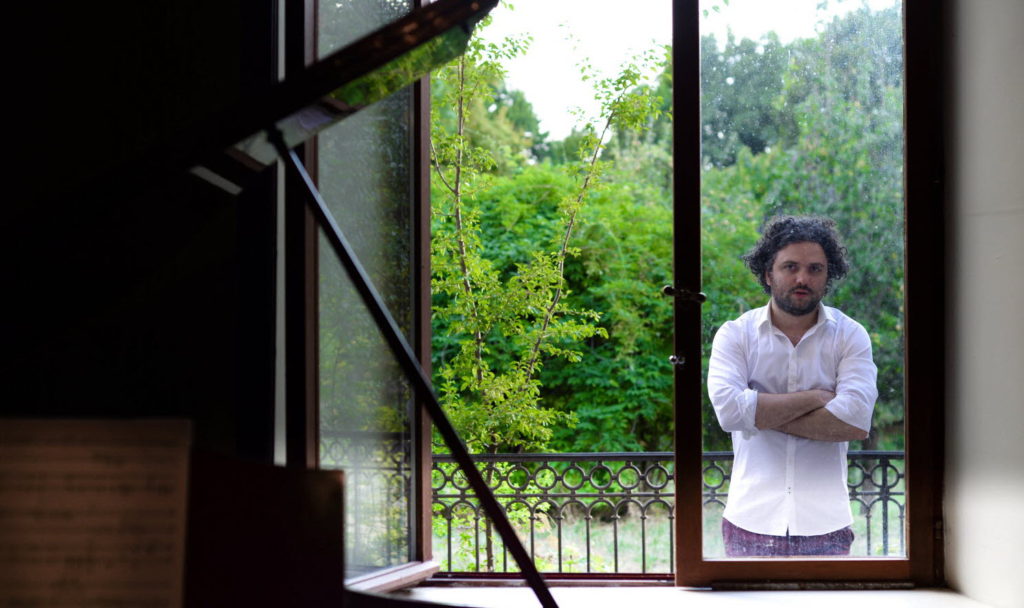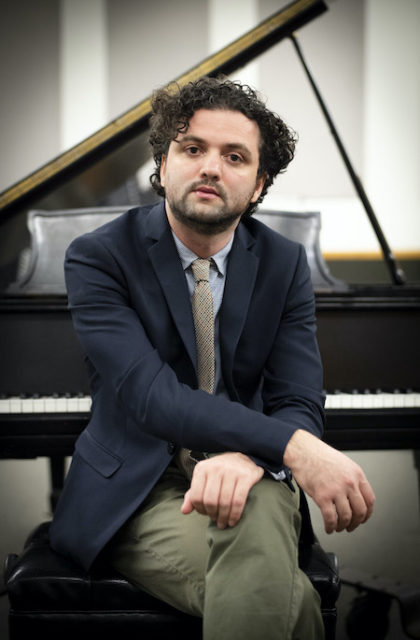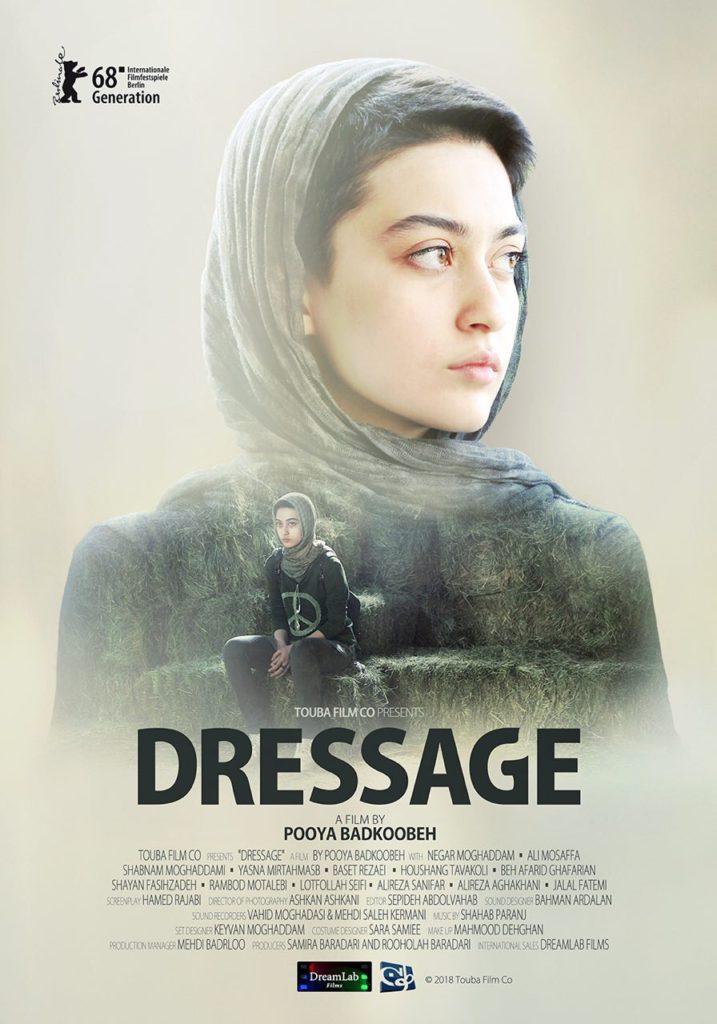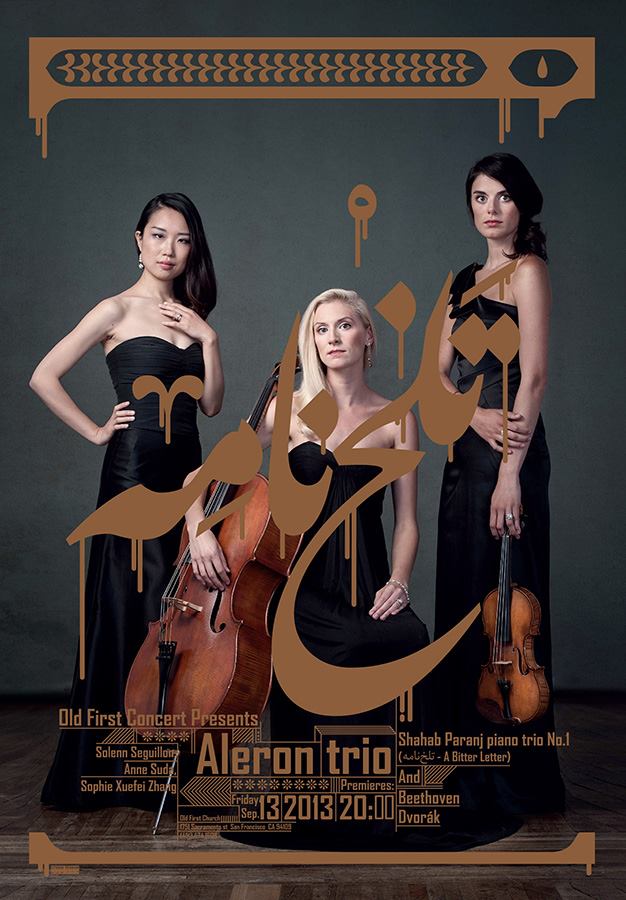
Compositeur basé à Los Angeles, Shahab Paranj séjourne actuellement à Fresne-Saint-Mamès. Il organise une retransmission de deux concerts donnés en live aux États-Unis depuis chez lui au château et à l’église Saint-Léger, avec roulements de groupes de 25 personnes environ.
Cultural harmony found in concert with Russian String Orchestra, UCLA composers

Six chosen UCLA student composers will finally hear their works performed live after traveling on a full tour in Moscow.
UCLA music professor Richard Danielpour, along with other members of the composition faculty, recently sifted through 30 submitted works by student composers and chose six of them they believed would be worthy of being played by the Russian String Orchestra across Russia. The six chosen compositions, along with two works by Danielpour, will be played in Schoenberg Hall on Monday. Danielpour, who has been in communication with Russian String Orchestra conductor Misha Rachlevsky, said they hope to showcase the students’ compositions to a broader audience after touring with the pieces in Moscow. They are working toward that goal with the orchestra’s residency at the UCLA School of Music and their tour of the United States.
“I’ve always felt that the priority is always to help train these … composers to become practicing artists in their field,” Danielpour said. “So bringing a professional group like (the Russian String Orchestra) to interact with and ultimately perform the works of some of our best student composers creates that simulated professional experience so that when they go out into the world, they understand what it is like to interact with and write for a professional ensemble.”
In choosing the six composers to present to the Russian String Orchestra, Danielpour said the UCLA composition faculty searched for pieces that each possessed an individual voice. And although he said it was difficult to choose only six, it was necessary to limit the number because the orchestra wanted to perform each piece twice to get the best recording possible for the composers.
Danielpour said he reached out to conductor Rachlevsky, which facilitated the connection between UCLA and the globe-traveling orchestra. This allowed student composers such as 2018 UCLA alumnus Dante Luna – who was the only undergraduate student to have his piece selected – to find a place to project their own musical pieces on a larger stage.
“Listen To Me” is a piece Luna said he spent only two weeks composing before the submission deadline, compared to the months many other composers took. He said the piece works on two different levels and plays with concepts of tonality and atonality. This makes it a whimsical and carefree coming-of-age piece with a precise intention that reflects feelings of being emotionally numb upon the end of a serious relationship, Luna said.
“I hope that people can take away or can understand that it’s a very playful piece,” Luna said. “On the outer ends, it’s very whimsical, but then there’s (a) climax to it, where you really see the vulnerable side of myself. So it’s like opening up a diary.”
Shahab Paranj, a PhD student and teacher of Musicology M6A: “Introduction to Musicianship,” was also chosen for his musical composition. Paranj said working with conductor Rachlevsky and a dedicated ensemble allowed him to feel free to do whatever he wanted musically and this freedom allowed him to share his story with his audience through his music. Paranj said his music has seen a lot of influence from both Western and Eastern classical styles as a result of his being raised in and living in Iran and eventually moving to the United States.
It is through the contrast between these styles that Paranj said he hopes to use his showcased work “Lost In Lut” to bridge the two influences in his music by combining Western-style microtonal harmony with Persian classical music, which has more progressions meant to imitate Persian instruments and sounds like dance music.
“Sometimes I’d rather have a long effect (with my music) rather than just having the effect that night where people get excited about it, and then forget about it,” Paranj said. “I try to introduce some technique and some music that (audiences) are not familiar with so maybe this (can) give them the chance to explore the other music from other parts of the world.”
By merging the different cultures of the Russian String Orchestra and the student composers at UCLA, the performance highlights the positive relationship that can be formed between countries through art, Danielpour said. It is this underlying concept and his desire to display UCLA students’ musical pieces which he credits as inspiration for the event, bringing together the Russian String Orchestra with the UCLA Herb Alpert School of Music. And it is through these collaborations that Danielpour said UCLA students are able to simulate a professional experience and work towards becoming practicing artists in their field.
“What (the Russian String Orchestra is) doing is they are extending themselves as artists from another country, and melding, merging and amalgamating their energies with American musicians and American artists,” said Danielpour. “We can all, on both sides, become richer and deeper as artists for that collaboration.”

‘Dressage’: Film Review | Berlin 2018
An Iranian teenage girl takes part in a robbery but the fun ends there in Pooya Badkoobeh’s moral drama, which won a special mention in Berlin’s Generation 14plus sidebar.
Clear-cut, allegorical and unsettling, Dressage might be viewed as an updated Crime and Punishment in which a 16-year-old girl commits a crime, gets away with it, but then finds she’s lost her moral bearings in the self-centered, materialistic world of her parents and friends. This first feature by Pooya Badkoobeh, who has made a career directing TV commercials, plunges deeply into the muddled, exasperating world of teenagers and never loses faith in its rebellious heroine, even when she goes off the rails and the audience’s favor wavers. It won a well-deserved special mention in Berlin’s Generation 14plus sidebar, but the moral quandary of this DreamLab release has adult appeal, too.
Expertly acted and lensed, Dressage has a quiet authority that goes beyond most first films. But it pushes the metaphoric side of its story too far at times, leaving its heroine abnormally detached from reality and puzzling to psyche out.
Its main asset, in any case, is luminous discovery Negar Moghaddam, who plays Golsa with the determination of Antigone. She’s never intimidated and never loses heart. You know she’s a rebel from the short butch haircut visible under her headscarf. But she’s also an inexperienced young girl who rejects the ways of an imperfect society and pays the price for her idealism.
In the fast-moving opener, Golsa joins a group of privileged rich kids who have just held up a grocery store in their small town outside Tehran. In the heady aftermath of the nighttime robbery, they suddenly realize they’ve forgotten to take the security camera footage, which will send them all to jail. The gang turns on Golsa with ill-disguised disdain for her lower-middle-class background and forces her to go back for it.
In a nicely tense recovery scene, she returns to the story solo and finds the clerk they knocked unconscious still lying on the floor with a bloody head wound. Not sure if he’s dead or alive, she slips the video player into her backpack.
All seems well until Amir (Yasna Mirtahmasb), the cowardly leader of the pack, demands she hand over the tape. Golsa says no. And she means it. Her stubborn refusal to put their minds at rest is never fully explained, though the humiliating slap Amir gives her probably has a lot to do with it.
It’s not like the robbery was a big secret: Amir’s arrogant father knows about it and tries to buy off the store owner, and Amir himself informs Golsa’s parents. The latter immediately take his side and, with shocking practicality, overlook the robbery to concentrate on the incriminating tape. Golsa’s father (Ali Mosaffa from Farhadi’s The Past) gives her a second slap in the face — for not turning over the recording. Incidentally, he tells her, Amir’s Dad can help them solve the family’s financial crisis if only she cooperates.
Golsa says nothing. She ignores their emotional blackmail, but on the other hand, she, too, is a blackmailer in the making through her control of the robbery tape. It’s clear she needs guidance, but there is no one to talk to. Like many teens, she has strained relations with her working dad and mom (Shabnam Moghadami), who are too busy trying to make money and move up in the world to pay attention to their daughter’s comings and goings or connect with her feelings.
Much of the action takes place at some expensive-looking riding stables, where Golsa finds a part-time job grooming the horses. There she also finds the kindness of a poor young stable hand (Baset Rezaei), the only person who recognizes how special she is and — maybe because they’re the same age — sympathizes with her passive rebellion. Sadly, her pure feelings for a show horse being prepped for dressage are used against her when it, too, becomes a pawn in the game of nerves between her and society.
The class divide that plays a major role in contemporary Iranian films is foregrounded here. Not only is Golsa’s family lower on the social ladder than her horseback riding friends, but there are exploited people even farther down, like the Afghan clerk (Lotfollah Seifi) who sleeps in the store for lack of money. Golsa’s naïve attempts to right social wrongs only make matters worse.
The camerawork emphasizes the girl’s restlessness inside her home (decorated with fragile glass knickknacks) and her sense of freedom running down the street (where the cops pick her up, for running, in a nicely symbolic moment). The fine lighting is by lenser Ashkan Ashkani, who leapt to the forefront in progressive New Wave films like Dormishian’s Lantouri and Rasoulof’s A Man of Integrity. Shahab Paranj’s delicate score lends unobtrusive feeling to the scenes.
Production companies: Touba Film
Cast: Negar Moghaddam, Ali Mosaffa, Shabnam Moghadami, Yasna Mirtahmasb, Baset Rezaei, HousangTavakoli, Beh Afarid Ghafarian, Lotfollah Seifi
Director: Pooya Badkoobeh
Screenwriter: Hamed Rajabi
Producers: Samira Baradari, Roohollah Baradari
Director of photography: Ashkan Ashkani
Production designer: Keyvan Moghaddam
Costume designer: Sara Samiee
Editor: Sepideh Abdolvahab
Music: Shahab Paranj
Venue: Berlin International Film Festival (Generation 14plus)
World sales: DreamLab Films
https://www.hollywoodreporter.com/review/dressage-1090195
https://www.sfcv.org/article/aleron-trio-to-feature-contemporary-persian-work

Aleron Trio, a much traveled and superstition-free ensemble, a product of the S.F. Conservatory of Music, is opening the season Friday, The Thirteenth, in Old First Church with a spectacular program.
Violinist Solenn Séguillon and cellist Anne Suda started Aleron three years ago, while still Conservatory students, joined last year by pianist Sophie Xuefei Zhang, who is getting her certificate in chamber music from the Conservatory.
The novelty on the concert is the Aleron-commissioned world premiere of contemporary Persian composer Shahab Paranj’s first piano trio, A Bitter Letter. “We have thoroughly enjoyed immersing ourselves in the sounds and culture of classical Persian music,” says violinist Séguillon, “and are thrilled to bring this exciting new work to our San Francisco audience.”
Also on the program will be Beethoven’s Ghost Trio as well as Dvorák’s Dumky Trio, which explores themes from traditional Czech music.
Paranj, born in Tehran in 1983, is based in the San Francisco Bay Area. Known for championing Persian music and culture throughout the world, Paranj’s style blends Persian rhythmic and melodic influences with Western texture and form.
Shahab Paranj’s Piano Trio No. 1 is composed in three movements, influenced by traditional classical Persian music.
Only a very small portion of music from ancient Persia is known. The primary reason that the body of surviving works is so small is the repeated invasions of Iran throughout history. Music, being one of the most fragile elements of any culture, is often the first to be lost.
Of these invasions, that of the Islamic Arabs was the most damaging to Persian culture and music. The raison d’etre of Persian music after this invasion became almost exclusively that of religious mourning or Taazie. Thus surviving lyrics and melodies from this era are mostly sad and sorrowful.
The traditional, classical Persian melodic system, raa-dif, consists of seven dast-gah, which organize melody into a number of different “tonal spaces.” The specific characteristics of raa-dif are twofold: The pitch structure is microtonal and the rhythm tends to be “limping” in uneven or additive meter. These two elements give a predominantly monophonic texture great variation.
Paranj’s Piano Trio No. 1 is based on two dast-gah: chahar-gah and homayoun. Each follows a specific melodic, rhythmic, and harmonic syntax. Movement I is based on chahar-gah, which emphasizes a vocal, parlando style with very free, almost a-metrical, rhythmic phrasing.
Movement II is based on an ostinato, presented in the piano, above which is juxtaposed Azeri folkloric and Persian chahar-gah melodies in the violin and cello. Instead of the mournful Taazie feeling of the previous two movements, in Movement III motives from the first two movements are combined with new material in the homayoun dast-gah, to create a vibrant rhythmic and jubilant, and ultimately triumphant finale.
Janos Gereben appreciates news tips, corrections, and words of encouragement at janosg@gmail.com.